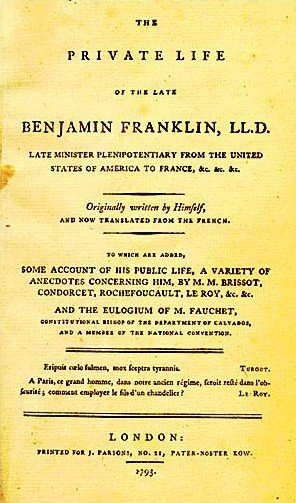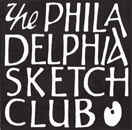
The Poor Richard Club was a private club in Philadelphia, Pennsylvania, whose members were mostly members of the advertising industry. The club bestowed an annual Gold Medal of Achievement to several celebrities, including several U.S. Presidents.

The Poor Richard Club was a private club in Philadelphia, Pennsylvania, whose members were mostly members of the advertising industry. The club bestowed an annual Gold Medal of Achievement to several celebrities, including several U.S. Presidents.
The club was founded in 1906 with 75 members, just a year after a similar club opened in New York. The advertising industry was on a quest for more respectability, and the clubs were created as a way to promote and enforce ethical guidelines. Nevertheless, they functioned largely as places to nurture business, social, and political relationships. [1] The first president was Thomas Martindale, a local grocer and importer. [2]
The following year, the club purchased a large Victorian house at 239–241 Camac Street, where their weekly lunches and monthly dinners were held. By 1911, membership had grown to 350. [1]
In 1916, the club published "Poor Richard's Dictionary of Philadelphia", an informative, sometimes humorous, guide to all aspects of the city, including historical landmarks, businesses, churches, hotels, hospitals, and clubs. The book was presented to Associated Advertising Clubs of the World members who attended the annual meeting held at the Poor Richard Club House. [3]
In 1925, the club moved to the Dr. Joseph Leidy House, 1319 Locust Street, which they shared with the Charles Morris Price School of Advertising and Journalism, founded by members of the club in 1920.
The club was instrumental in proposing, funding, and raising the Benjamin Franklin National Memorial, built in 1933. [4]
On January 17, 1956, the club held their 50th anniversary dinner at The Bellevue-Stratford Hotel and honored then Vice President Richard Nixon with the Gold Medal of Achievement. [5] The club had over 600 members in the 1930s, but membership declined in the 1970s. The Locust Street building was sold in 1979, and the club disbanded a few years later. [6]
The club's major event was its annual banquet, at which the members presented an annual award for public service. [1] Among the recipients of the club's Gold Medal of Achievement were:
|
|

Benjamin Franklin was an American polymath who was active as a writer, scientist, inventor, statesman, diplomat, printer, publisher, and political philosopher. Among the leading intellectuals of his time, Franklin was one of the Founding Fathers of the United States, a drafter and signer of the Declaration of Independence, and the first postmaster general.

The Sesqui-Centennial International Exposition of 1926 was a world's fair in Philadelphia, Pennsylvania. Its purpose was to celebrate the 150th anniversary of the signing of the United States Declaration of Independence, and the 50th anniversary of the 1876 Centennial Exposition.

The Franklin Institute is a science museum and the center of science education and research in Philadelphia, Pennsylvania. It is named after the American scientist and statesman Benjamin Franklin. It houses the Benjamin Franklin National Memorial. Founded in 1824, the Franklin Institute is one of the oldest centers of science education and development in the United States. Its chief astronomer is Derrick Pitts.

The American Philosophical Society (APS), founded in 1743 in Philadelphia, is a scholarly organization that promotes knowledge in the sciences and humanities through research, professional meetings, publications, library resources, and community outreach. It was founded by Benjamin Franklin and is considered the first learned society in the United States.

Poor Richard's Almanack was a yearly almanac published by Benjamin Franklin, who adopted the pseudonym of "Poor Richard" or "Richard Saunders" for this purpose. The publication appeared continually from 1732 to 1758. It sold exceptionally well for a pamphlet published in the Thirteen Colonies; print runs reached 10,000 per year.

The Autobiography of Benjamin Franklin is the traditional name for the unfinished record of his own life written by Benjamin Franklin from 1771 to 1790; however, Franklin appears to have called the work his Memoirs. Although it had a tortuous publication history after Franklin's death, this work has become one of the most famous and influential examples of an autobiography ever written.
Elias St. Elmo Lewis was an American advertising advocate. He wrote and spoke prolifically about the potential of advertising to educate the public. He was inducted into the Advertising Hall of Fame posthumously, in 1951. He is the author of AIDA marketing model.
The California Art Club (CAC) is one of the oldest and most active arts organizations in California. Founded in December 1909, it celebrated its centennial in 2009 and into the spring of 2010. The California Art Club originally evolved out of The Painters Club of Los Angeles, a short-lived group that lasted from 1906–09. The new organization was more inclusive, as it accepted women, sculptors and out-of-state artists.

The Philadelphia Sketch Club, founded on November 20, 1860, in Philadelphia, Pennsylvania, is one of America's oldest artists' clubs. The club's own web page proclaims it the oldest. Prominent members have included Joseph Pennell, Thomas Eakins, A.B. Frost, Howard Chandler Christy, and N.C. Wyeth.

Sons of the Revolution is a hereditary society which was founded in 1876 and educates the public about the American Revolution. The General Society Sons of the Revolution headquarters is a Pennsylvania non-profit corporation located at Williamsburg, Virginia. The Society is governed by a board of managers, an executive committee, officers, standing committees and their members, and staff. The General Society includes 28 State Societies and chapters in the United States, as well as Europe.

The Aztec Club of 1847 is a military society founded in 1847 by United States Army officers of the Mexican–American War. It is a hereditary organization, including members who can trace a direct ancestral connection to those initially eligible.

The Human Resources Management Association of Chicago (HRMAC) is a corporate membership organization focused on delivering services to primarily Chicago area employers. As the oldest traditional such organization in the U.S., it is a stand-alone group unaffiliated with any other state or national organizations. It serves as a forum for human resources leaders, practitioners, service providers and business executives responsible for designing and implementing workforce strategies to drive business performance in their organizations. In October of 2021, HRMAC merged with the Executives' Club of Chicago and formed The HRMAC Institute within the Exec Club.


Young's Hotel (1860–1927) in Boston, Massachusetts, was located on Court Street in the Financial District, in a building designed by William Washburn. George Young established the business, later taken over by Joseph Reed Whipple and George G. Hall. Guests at Young's included Mark Twain, Elizabeth Cady Stanton, William Lloyd Garrison, Charles Sumner, Rutherford B. Hayes, and numerous others.
The Charlotte Cushman Foundation (CCF) is a philanthropic organization in Philadelphia, Pennsylvania, incorporated in the Commonwealth of Pennsylvania. It is named after actress Charlotte Cushman (1817-1876). The Charlotte Cushman Foundation funds Philadelphia, regional non-profit theatres with grants for performers. The purpose of the Foundation is to promote the theatre arts and the public appreciation thereof.
The Franklin Inn Club is a private social club in Philadelphia, Pennsylvania. Founded in 1902 as a literary society, it is one of the four historic gentlemen's clubs in Philadelphia's Center City and was the first to open membership to women in Philadelphia.

The Penn Club of New York is an American 501(c)7 not-for-profit, private social club located on Clubhouse Row in the Midtown Manhattan neighborhood of New York City. The club's 14-story building, which is a designated landmark, is located at 30 West 44th Street and initially was occupied by The Yale Club of New York City.

This is a comprehensive list of primary and secondary works by or about Benjamin Franklin, one of the principal Founding Fathers of the United States. Works about Franklin have been consistently published during and after Franklin's life, spanning four centuries, and continue to appear in present-day publications. Scholarly works that are not necessarily subject-specific to Franklin, yet cover his life and efforts in significant measure, may also be included here. In contrast, this bibliography does not include the numerous encyclopedia articles and short essays about Franklin..
Philomath Club was an American literary club of Jewish women. It was established in San Francisco, California in March 1894, its slogan being: Onward and Forward! Mrs. I. Lowenberg conceived the idea of forming a "Jewish Women's Literary Club". Philomath had the distinction of being the first club in the world composed of Jewish women with a regularly adopted constitution.
Thomas Martindale (1845–1916) was an English-born American merchant, grocer, tea importer, and author. He founded Martindale and JohnsonThomas Martindale Company, and Martindale's Natural Markets, his stores are thought to be the first natural foods store in the United States. He might be one of the best known grocers in the United States, and in his local city of Philadelphia. Martindale was an advocate of health foods and physical activity, who also supported infrastructure investments and innovations.